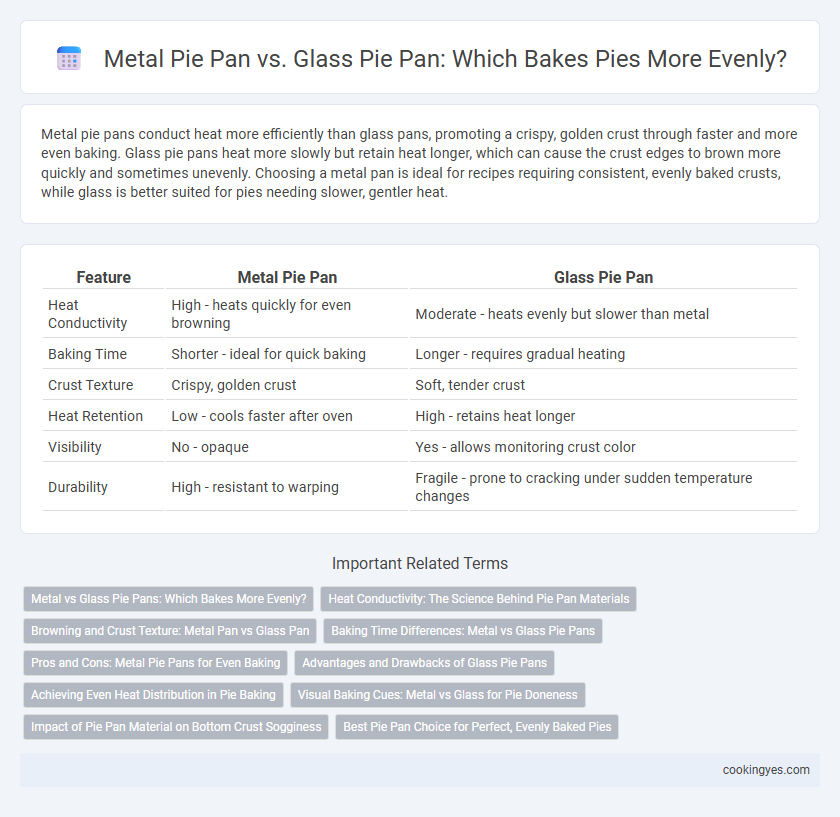Metal pie pans conduct heat more efficiently than glass pans, promoting a crispy, golden crust through faster and more even baking. Glass pie pans heat more slowly but retain heat longer, which can cause the crust edges to brown more quickly and sometimes unevenly. Choosing a metal pan is ideal for recipes requiring consistent, evenly baked crusts, while glass is better suited for pies needing slower, gentler heat.
Table of Comparison
| Feature | Metal Pie Pan | Glass Pie Pan |
|---|---|---|
| Heat Conductivity | High - heats quickly for even browning | Moderate - heats evenly but slower than metal |
| Baking Time | Shorter - ideal for quick baking | Longer - requires gradual heating |
| Crust Texture | Crispy, golden crust | Soft, tender crust |
| Heat Retention | Low - cools faster after oven | High - retains heat longer |
| Visibility | No - opaque | Yes - allows monitoring crust color |
| Durability | High - resistant to warping | Fragile - prone to cracking under sudden temperature changes |
Metal vs Glass Pie Pans: Which Bakes More Evenly?
Metal pie pans conduct heat more efficiently than glass, resulting in a crisper, evenly baked crust with golden edges. Glass pie pans heat more slowly but retain heat longer, which can cause the pie to continue baking after removal from the oven, potentially leading to overcooked filling. For evenly baked pies, especially fruit or custard varieties, metal pans often provide more consistent results due to superior heat conductivity.
Heat Conductivity: The Science Behind Pie Pan Materials
Metal pie pans, typically made from aluminum or stainless steel, offer superior heat conductivity, allowing for rapid and even heat distribution that results in uniformly baked pie crusts. Glass pie pans, while less conductive, retain heat longer and provide steady baking temperatures but may cause slower crust browning due to uneven heating. Understanding thermal conductivity values--aluminum's approximately 235 W/m*K versus glass's 1 W/m*K--explains why metal pans often outperform glass in achieving crispy, evenly baked crusts.
Browning and Crust Texture: Metal Pan vs Glass Pan
Metal pie pans conduct heat more efficiently than glass pans, resulting in a browner, crisper crust that is ideal for flaky pastries. Glass pans heat more slowly and retain heat longer, often producing a more evenly cooked filling but a less browned, softer crust. For achieving a balance between well-browned crust and even baking, many bakers prefer metal pans, especially aluminized steel or heavy-gauge aluminum varieties.
Baking Time Differences: Metal vs Glass Pie Pans
Metal pie pans conduct heat more efficiently than glass, leading to shorter baking times and crisper crusts. Glass pans heat more slowly and retain heat longer, which can result in longer baking times but more evenly cooked fillings. Adjusting baking time by reducing it for metal pans and increasing it slightly for glass pans ensures perfectly baked pies.
Pros and Cons: Metal Pie Pans for Even Baking
Metal pie pans excel in even heat conduction, ensuring a crisp, evenly baked crust by distributing heat quickly and efficiently. Their durability and lightweight nature make them ideal for frequent use, but they can brown crusts faster, requiring careful monitoring to prevent burning. However, metal pans do not retain heat as long as glass, potentially resulting in uneven baking if the oven temperature fluctuates.
Advantages and Drawbacks of Glass Pie Pans
Glass pie pans offer excellent heat retention and even baking, ensuring the crust cooks thoroughly without burning. They allow home bakers to monitor the browning process visually, reducing the risk of overbaking. However, glass pans typically heat more slowly and can lead to uneven browning on the crust's bottom compared to metal pans, sometimes resulting in a soggier base.
Achieving Even Heat Distribution in Pie Baking
Metal pie pans excel at achieving even heat distribution due to their high thermal conductivity, promoting a crisp, well-browned crust. Glass pie pans heat more slowly and retain heat longer, which can result in uneven baking and potentially undercooked filling. For consistent results and precise temperature control, metal pans are preferred in pie baking.
Visual Baking Cues: Metal vs Glass for Pie Doneness
Metal pie pans conduct heat more efficiently, leading to crisper, evenly browned crusts with clear visual baking cues like golden edges and bubbling filling. Glass pie pans offer slower, more uniform heat distribution, allowing bakers to observe browning progress through the transparent material, which helps identify doneness based on visual signs such as deepening crust color and bubbling around the edges. Understanding these differences in heat conduction and visual feedback ensures optimal pie doneness by aligning baking time with the pan's material characteristics.
Impact of Pie Pan Material on Bottom Crust Sogginess
Metal pie pans conduct heat more efficiently than glass pans, resulting in a crisper and less soggy bottom crust. Glass pans heat more slowly and retain heat longer, which can cause excessive moisture accumulation and a softer, sometimes soggy crust. Choosing a metal pie pan is ideal for achieving a well-baked, firm bottom crust that supports the overall texture of the pie.
Best Pie Pan Choice for Perfect, Evenly Baked Pies
Glass pie pans offer superior heat retention and even baking due to their ability to distribute heat consistently, which prevents hot spots and ensures a uniformly cooked crust. Metal pie pans, especially aluminum, heat up quickly and provide excellent browning, but they may cause uneven baking if not closely monitored. For perfectly baked pies with an evenly cooked crust, glass pie pans are generally the best choice, while metal pans suit those seeking faster, crispier results.
Metal pie pan vs glass pie pan for even baking Infographic

 cookingyes.com
cookingyes.com